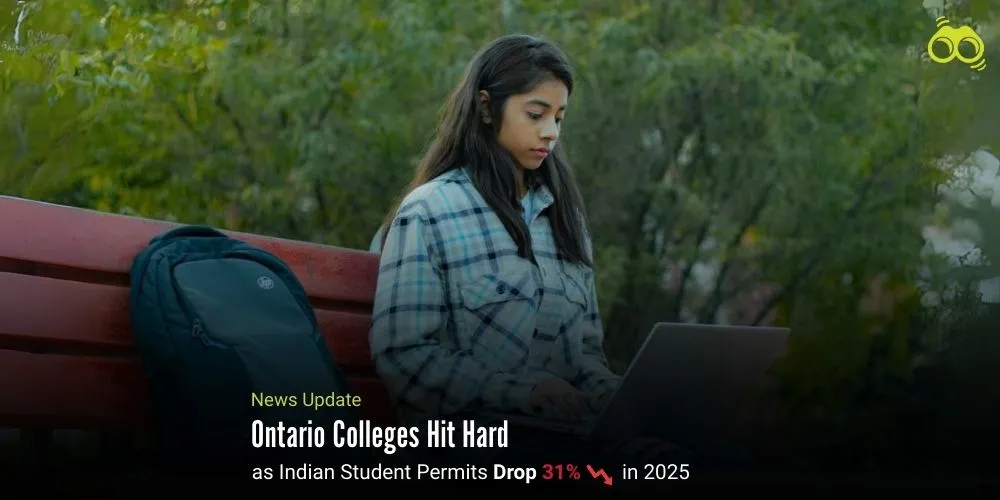Federal Study Permit Cap Triggers Mass Layoffs Across Ontario’s Public Colleges
Nearly 10,000 Jobs Lost as Ontario’s Colleges Struggle with Funding and Student Decline
A deepening employment crisis is quietly unfolding across the education sector, driven by budget cuts, declining enrollment, and increasing financial strain. These pressures are leading to widespread staff layoffs and the reduction of academic programmes. Ontario’s public colleges are currently experiencing one of the most severe job crises in the province’s history. Projections suggest that up to 10,000 staff could be laid off across 24 institutions. By June 2025, 19 colleges had already reported more than 8,000 job losses, a figure expected to grow as further data becomes available.
This crisis is primarily linked to a 48% decline in international student enrolment, a consequence of the federal government’s study permit cap introduced in early 2024. This sharp drop has triggered the cancellation or suspension of over 600 academic programmes and has led to the closure of multiple campuses. Before the cap, international students accounted for 32% of college revenue, making institutions heavily reliant on their tuition fees.
Union leaders have criticised the provincial government for long-term underfunding, arguing that it has exacerbated the situation. Although the government has announced $1.75 billion in new funding, this falls short of the $2.5 billion recommended by its expert panel. Further compounding the crisis, recent data from Immigration, Refugees and Citizenship Canada (IRCC), cited by The Indian Express, revealed that only 30,640 Indian students were granted study permits in the first quarter of 2025, representing a 31% decline compared to the same period in 2024. Analysts have interpreted this trend as part of a broader shift in Canadian immigration policy, mirroring tighter international student regulations in the United States.
To manage pressure on housing and public services, the Canadian government capped study permits at 437,000 for 2025, a 10% reduction from 2024. Earlier data indicated that only 96,015 permits had been issued in early 2025, compared to 1,21,070 during the same period the previous year. Experts warn that this cautious stance could continue to impact Indian student enrolment significantly.
A 2023 New York Times report noted that more than 60% of international students in Ontario’s public colleges were from India. Subsequently, IRCC data revealed that around 20,000 Indian students did not arrive at their assigned institutions in March and April, raising further concerns about enrolment reliability. In light of these developments, Ontario is experiencing one of the largest waves of mass layoffs in its history. At a press conference, OPSEU President JP Hornick remarked that the job losses had exceeded those from the Hudson’s Bay liquidation. He cautioned that the impact of the cuts would be generational, particularly as public colleges play a crucial role in providing accessible training during times of economic disruption.
The union, which represents approximately 55,000 college staff, reported that nearly 1.5 million Ontarians or one in ten residents, have witnessed a campus closure in their area. It also highlighted that 23 of the 24 public colleges in Ontario had experienced a 48% drop in international student numbers since September 2023, attributing this decline as a major factor in the widespread job and programme losses.
Additionally, OPSEU accused the provincial government of failing to fully disclose the scale of the crisis and criticised it for not adequately funding the post-secondary sector. According to the union, stronger investment and better policy planning could have helped avert the current situation. In response, Bianca Giacoboni, spokesperson for Colleges and Universities Minister Nolan Quinn, dismissed the union’s claims as “baseless and categorically false.” She stated that, over the past 14 months, the government had committed more than $2 billion in new funding to publicly-assisted colleges and universities, supplementing the $5 billion it already allocates annually.
Giacoboni further noted that a formal review of the college funding model is scheduled to begin in the summer, indicating the government’s intent to address structural issues. Meanwhile, Centennial College contested OPSEU’s assertion of cutting over 100 programmes, clarifying that only 54 had been suspended in 2025. These responses suggest that both the government and institutions view the union’s warnings as overstated and insist that substantial support is already underway. The crisis in Ontario’s public colleges underscores the fragile dependence on international student revenue and the urgent need for sustainable funding reforms.
Editor’s Note:
Ontario’s public colleges are going through one of the worst crises in their history, with close to 10,000 staff losing their jobs and more than 600 academic programmes being suspended at 24 colleges. This serious problem is not just the result of recent federal decisions, but also highlights deeper issues, especially the colleges' heavy dependence on international student fees and years of low funding from the provincial government. The federal government’s decision to limit study permits in early 2024 caused a 48% drop in international student enrolment. Since these students provided nearly one-third of college income, the drop has badly affected budgets. As a result, many colleges have laid off staff, shut down campuses, and cut important training programmes in fields like nursing, environmental science, and hospitality. Ontario has announced over $2 billion in new funding, but this is less than the $2.5 billion its expert panel recommended. Some colleges, like Centennial, dispute union claims about program cuts, while others work with partners to manage finances. However, slow information release has caused public mistrust and calls for change. Globally, colleges in the U.S. and U.K. have addressed similar issues by diversifying revenue, establishing international branches, and prioritising local student recruitment. Ontario’s colleges may need to adopt similar strategies, while the government must urgently improve funding and planning.
Skoobuzz observes that this situation needs urgent action, clear communication, and stronger support for public education. Without it, Ontario’s college system could face long-term harm that will be difficult to fix.














0 Comments (Please Login To Continue)